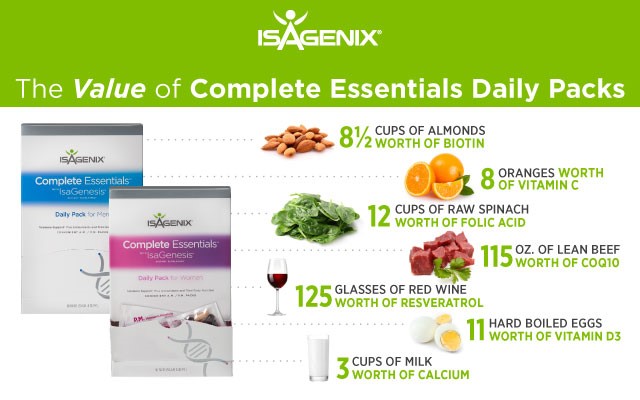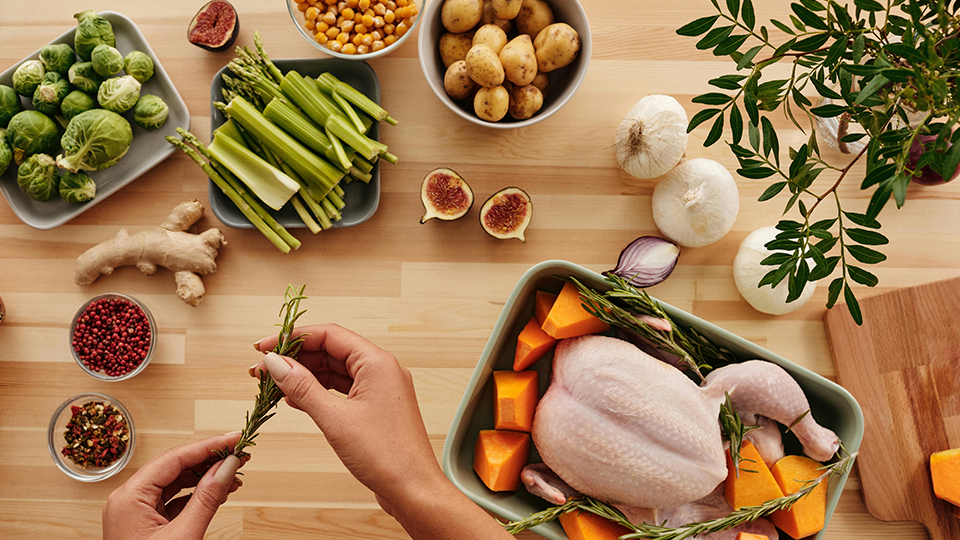When taken daily, Complete Essentials™ Daily Pack gives you the equivalent amount of vitamin C found in eight oranges, the chromium found 10 cups of broccoli, the magnesium in four dark chocolate squares and the biotin in a half cup of almonds.
Each time you take both an a.m. and p.m. packet, you will also get:
- Calcium at the equivalent bone-building daily dose found in three cups of milk and the vitamin D found in eight hard-boiled eggs.
- Vitamin E — including in its new 21st-century form as tocotrienols, for brain and heart health—at a dosage you’d normally only achieve from eating more than a cup of peanut butter daily.
- CoQ10 at the equivalent dose of what’s found in 115 ounces of beef.
- Resveratrol at the equivalent dose of what’s found in more than 100 glasses of red wine (without the extra calories or damage to your liver).
- Plus, long-chain DHA and EPA omega-3 fatty acids at the equivalent dose that’s achieved by consuming 6 ounces of wild-caught salmon to meet American Heart Association’s recommendations.
But even solid nutritional supplements come with myths, and we are here to break them down.
Myth: It’s not necessary to supplement for optimal health.
Fact: While a nutrient-dense diet is a key aspect to living a healthy lifestyle, even experts agree that it’s difficult to achieve the recommendations for all vitamins, minerals and bioactive ingredients from food alone. Here are the statistics:
- Only one in four adults in the U.S. eats five or more fruits and vegetable servings daily (1).
- Only one in five adults eats the recommended two servings of fish per week (2).
- The majority of Americans are deficient in vitamins and minerals including vitamin D, calcium and magnesium (3).
Taking CEDP removes the guesswork out of making sure you’re covering your necessary nutritional gaps, helping you lead a healthier lifestyle without the overload of calories from trying to get everything from food.
Myth: CEDP is just like any everyday multivitamin.
Fact: Most multivitamins give you 100 percent of the recommended daily value established by the Institute of Medicine. But Isagenix focuses on providing you with dosages, delivery formats and forms that are in line with the latest, most advanced nutritional science for leading an active, age-defying lifestyle.
The a.m. and p.m. packets are comprised of up to five different products with dosages spread over the course of the day:
- Essentials for Women™ and Essentials for Men™ – Targeted nutritional support by gender
- CytoActives™ – Special bioactives (coQ10, vitamin D3, resveratrol and tocotrienols) to support optimal cellular health
- IsaOmega™ – Maximum-concentration supplement of fish-derived EPA and DHA omega-3 fatty acids for heart and brain health
- C-Lyte® – A high-dose vitamin C and citrus bioflavonoid for flexible arteries and blood vessels
- IsaGenesis® (optional) – To support integrity of telomere length, which is a biomarker for healthy aging
Myth: CEDP is too expensive.
Fact: When you consider how much it would cost to purchase the foods and supplements you need to meet your nutritional goals for the week, CEDP starts looking like a deal. Not only are our products affordable, we also source all of our ingredients with high-quality purity standards.
Myth: You get all the nutrition you need from IsaLean® Shake.
Fact: IsaLean Shake is a nutrient-dense meal replacement that’s clinically supported to help with weight loss and muscle maintenance. However, it alone cannot provide all the nutrients and bioactives that your body needs daily for an active, healthy lifestyle.
One of the major reasons the shake isn’t able to supply all your daily recommendations for nutrients and bioactives is because those nutrients can give off a bitter, unappealing flavor.
For a full perspective of all of the nutrition that’s provided by CEDP on a daily basis, refer to the table below:
| Nutrient | Amount in CEDP for Women and Men | Food Equivalent | |
| Vitamin A (beta carotene) | 11,666 IU | 11,666 IU | 5 ¼ whole mangos (2,240 IU/mango) |
| Vitamin C | 666 mg | 666 mg | 13 oranges (51 mg/small orange) |
| Calcium | 900 mg | 800 mg | 3 cups milk (305 mg/ glass 1%) |
| Vitamin D3 | 5,000 IU | 5,000 IU | 11 hard boiled eggs (441 IU/ 50 g egg) |
| Vitamin E (+ tocotrienols) | 84 IU | 54 IU | 1.2 cups peanut butter (4.35 IU/ 2 tbsp) |
| Vitamin K2 | 80 mcg | 80 mcg | 6 chicken breasts (13 mcg/ 3 oz serving) |
| Thiamin (vitamin B1) | 7.5 mg | 7.5 mg | 9 ½ cups cooked black beans (.4 mg/ ½ cup) |
| Riboflavin (vitamin B2) | 8.5 mg | 8.5 mg | 7.7 cups cooked oats (1.1 mg/ 1 cup) |
| Niacin (vitamin B3) | 20 mg | 20 mg | 6 ¼ cups cooked green peas (3.2 mg/ cup) |
| Vitamin B6 | 10 mg | 10 mg | 25 bananas (.4 mg/ medium banana) |
| Folic Acid | 600 mcg | 600 mcg | 12 cups raw spinach (58 mcg/ cup) |
| Vitamin B12 | 54 mcg | 39 mcg | 60 oz Swiss cheese (.9 mcg/ 1 oz serving) |
| Biotin | 500 mcg | 300 mcg | 8 ½ cups almonds (29.4 mcg/ ½ cup) |
| Pantothenic acid (vitamin B5) | 45 mg | 10 mg | 21 avocados (2.1 mg/ medium avocado) |
| Iodine | 200 mcg | 200 mcg | 35 oz tuna (17 mcg/ 3 oz serving) |
| Magnesium | 200 mg | 200 mg | 4 squares dark chocolate (48 mg/ 15 g square) |
| Zinc | 15mg | 15 mg | 6 cups cooked chickpeas (2.5 mg/ cup) |
| Selenium | 100 mcg | 100 mcg | 8 ounces shrimp (56 mcg/ 4 oz serving) |
| Copper | 2 mg | 2 mg | 10 cups kale (.2 mg/ cup) |
| Manganese | 2 mg | 2 mg | 3.6 cups strawberries (.56 mg/ cup) |
| Chromium | 200 mcg | 200 mcg | 10 cups broccoli (18.5 mcg/ cup) |
| Molybdenum | 75 mcg | 75 mcg | ½ cup lentils (148.5 mcg/cup) |
| Potassium | 50 mg | 50 mg | *Best from foods like banana, potato or avocado |
| Boron | 500 mcg | 1 mg | *Best from foods like chickpeas, almonds or beans |
| Vanadium | 5 mcg | 5 mcg | *Best from sunflower seed, peanut or olive oil |
| CoQ10 | 100 mg | 100 mg | 115 ounces beef (2.6 mg/ 3 oz. serving) |
| Resveratrol | 50 mg | 50 mg | 125 glasses of wine (.03-1.1 mg/ 5 oz. glass) |
| Omega-3 fatty acids | 1200 mg | 1200 mg | 6 oz of wild salmon (500-1000 mg/ 3 oz. serving) |
*Source: http://ndb.nal.usda.gov/ndb/search/list
References
- Krebs-Smith et al. Americans do not meet federal dietary recommendations. J Nutr 2010; 140: 1832-8.
- Attitudes and Beliefs About Eating Fish: A National Opinion Survey Conducted for The Center for Food, Nutrition and Agriculture Policy.
- Ford ES, Mokdad AH. Dietary magnesium intake in a national sample of US adults. J Nutr. 2003 Sep;133(9):2879-82.





